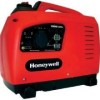Honeywell HW1000i Owners Manual - Page 12
Grounding the Generator, Using Generator for Back-up Power
 |
UPC - 894190002186
View all Honeywell HW1000i manuals
Add to My Manuals
Save this manual to your list of manuals |
Page 12 highlights
Grounding the Generator Grounding the Generator Grounding the Generator WARNING Generators produce powerful voltage that can cause death or great physical harm. • Before using generator, consult a licensed electrician, electrical inspector, or local agency having jurisdiction for local codes or ordinances that apply to the intended use of generator. 2000 RATED WATTS 2100 MAXIMUM WATTS NEUTRAL FLOATING NEUTRE FLOTTANT FIGURE 5: Ground Terminal (HW2000i Model Illustrated) NOTE: The generator is neutral floating which means the ground terminal on the generator is not connected to the AC neutral wire in the generator. If using a receptacle tester, it will not show the same ground circuit condition as for a home receptacle. Special Requirements There may be Federal or State Occupational Safety and Health Administration (OSHA) regulations, local codes, or ordinances that apply to the intended use of generator. Consult a licensed electrician, electrical inspector, or the local agency having jurisdiction. • In some areas, generators are required to be registered with local utility companies. • If generator is used at a construction site, there may be additional regulations which must be observed. Using Generator for Back-up Power DANGER Improper connections of the generator to a building's electrical system can be deadly. Electrical current from generator can feedback into utility lines. Such feedback may electrocute utility company workers or others who contact utility lines during a power outage. Electrical current can feedback into generator. When utility power is restored, generator may explode, burn, or cause fires in building's electrical system. • Before connecting to a building's electrical system, consult a licensed electrician, electrical inspector, or local agency having jurisdiction for local codes or ordinances that apply to the intended use of generator. Generator Grounding Intended Use Connection to Grounding Electrode Equipment connected to generator receptacles by a cord and plug Not Required All other uses (such as direct connection to a building's electrical system) May Be Required; Consult a Licensed Electrician Source: National Electrical Code 2008, Section 250.34 6 www.honeywellgenerators.com HW1000i / HW2000i Inverter Generator Owner's Manual















